Towards the end of the third season of Murder, She Wrote is the episode, The Days Dwindle Down. It’s one of my favorite kinds of mystery stories—a historical mystery. Jessica is asked to investigate a killing which took place thirty years ago.
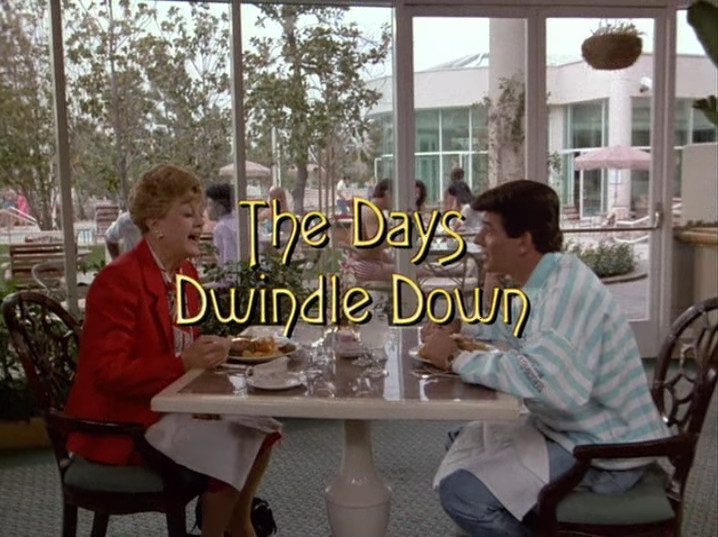
Very unusually for a Murder, She Wrote title screen, it features Jessica in it. She’s talking with a publicist, who wants to use the real-life murders she’s solved in order to sell books. I’m not clear on what his actual plan is, but it doesn’t matter because he’s not really a character in this story. He’s only here to introduce the information that Jessica solves real-life crimes to one of the real characters:
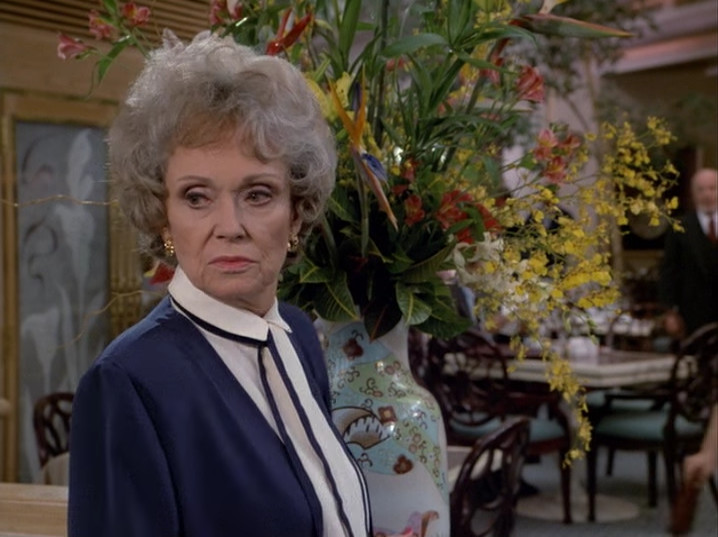
This is Georgia Wilson. She’s the one who asks Jessica to solve the thirty year old mystery. It happens not long after the breakfast meeting. She shows up at Jessica’s room and asks if she can come in because she could be fired if anyone sees her bothering Jessica. It turns out that her husband just got out of prison for a murder he didn’t commit, and she wants Jessica to… actually, she never really says. He’s a broken man and she wants him to be repaired so they can enjoy whatever years they have left, but she doesn’t say what Jessica can do to bring this about. She does ask Jessica to come and listen to his story, though, which is at least actionable.
When Jessica arrives, Sam is sitting in his chair, staring out of the window.

After a minute or so in which Sam is grumpy, he agrees to tell the story of what happened. And here we come to something fascinating about this episode: it is actually based on a movie. The movie is called Strange Bargain and was released in 1949. Since this episode first aired in 1987, the events depicted really took place thirty eight years before. Everyone in Hollywood always plays younger, even the movies themselves, it turns out. It works, though, and the flashbacks are done using footage from the movie.
Sam’s story starts out with Gloria talking Sam into asking his boss, Mr. Jarvis, for a raise. He makes an appointment and manages to get past Mr. Jarvis’s personal secretary, who was an intimidating character in her own right.
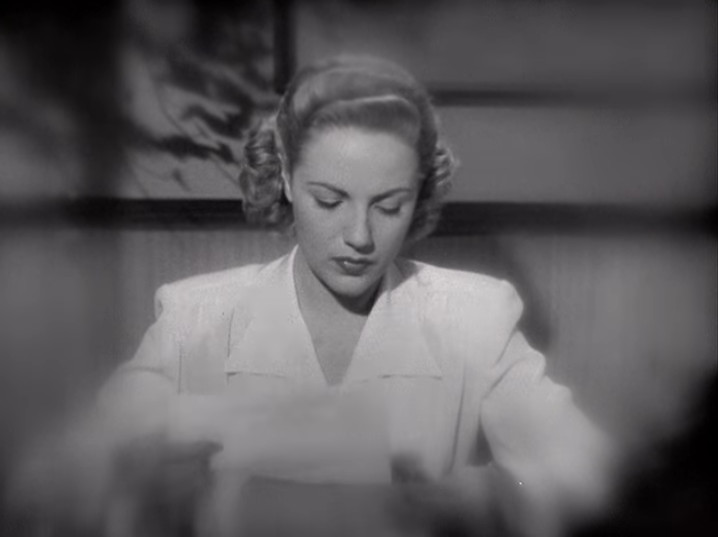
He did get past her, though, and saw Mr. Jarvis. Unfortunately, after he asked for the raise, Mr. Jarvis told him that he was fired because the company is in financial trouble and they have to cut costs.
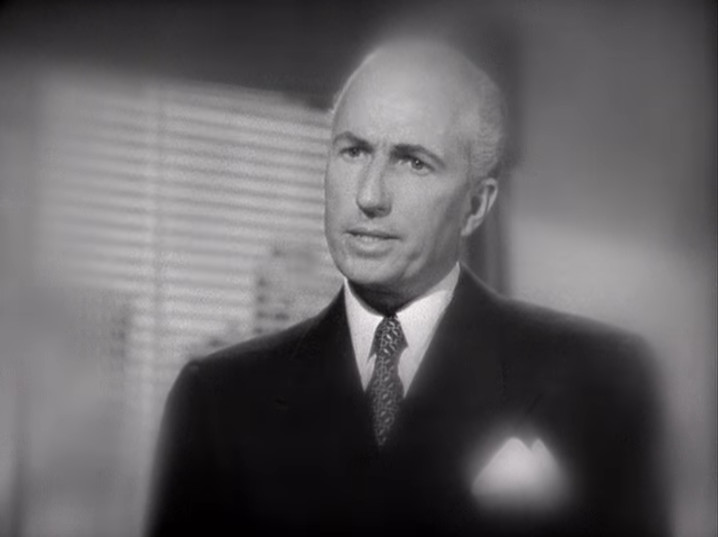
He, himself, had sunk all of his money into the firm except for about $10,000 dollars. (That would have been worth in the neighborhood of $50,000 in 1987 dollars and $109,000 in 2020 dollars.) Later that day, Mr. Jarvis took Sam out for a drink and offered a, well, a strange bargain. He had recently increased his life insurance policy to $250,000 (about $2.7M in 2020), and was planning to kill himself so that his wife and child would get the money. He would give Sam the $10,000 he had left if Sam would clean up the crime scene to make it look like murder instead of suicide so that his family would get the insurance money.
Sam at first refused, but Jarvis called him at home and told him that he was going through with it earlier than he originally planned and begged Sam to help him. Sam drove there to talk him out of it but by the time he got there Mr. Jarvis was already dead. The envelope with the money was there, and Jarvis had already done it, so Sam took the money and did as Jarvis had asked him to do. He forgot to fire the shots when he was in the library, though, so he fired them through the library window. Before going home he drove to the Santa Monica peer and threw the gun away underneath the pier.
Unfortunately, after he washed the blood off of his hands he forgot to wash the blood off of the steering wheel in his car. Also, the next day, when they went to pay their respects to the widow, Lieutenant Webb was there and told them that though the gun hasn’t been found the three bullets matched—the one in the body and two that were fired into the wall. When Webb said this, Sam looked at where he fired the shots into the wall. Webb was looking for it.

“Ah, yes, Mr. Wilson. Right there.” From this point on, Webb was convinced that Sam did it and was out to get him, at least according to Gloria. She also had a complaint that Sam had done everything he could to help Mr. Jarvis but Mrs. Jarvis and Sidney (Jarvis’s son) didn’t lift a finger to help him.
Sam telling Gloria that the Jarvis’s couldn’t have known about Jarvis’ plan is interrupted by Sam and Gloria’s son Rod and his very pregnant wife Terry coming in.

Jessica said she would like to meet Lieutenant Webb, but Rod wishes her luck. He tried, himself, but was told that Webb was retired and “unavailable”.
Rod gives Jessica a lift back to her hotel, where he fills her in on a few more details. He became a police officer in order to try to clear his father. The police file on the Jarvis case was missing, so he assembled his own file on the case full of newspaper clippings, court depositions—every scrap of evidence and information he could get his hands on. He lends this to Jessica. Jessica speculates that the reason why it wasn’t possible to prove suicide is that perhaps there’s a possibility that no one had yet considered: what if someone else had murdered Jarvis and only made it look like suicide when Sam found the body?
While this is an intriguing possibility, I’m not sure that it’s really justified. It would be different if there should have been evidence of the suicide which wasn’t there, but in fact the evidence was there, where you would have expected it. Furthermore, its disappearance is adequately accounted for. The reason that there is no evidence to prove suicide is that Sam destroyed it all. Speculating that someone actually murdered Mr. Jarvis doesn’t account for anything. Jessica seems to really like this idea, though, and takes it as a working hypothesis.
The next day they go to the house where Mr. Jarvis died.

This is one of those cases where it’s unfortunate that Murder, She Wrote wasn’t filmed in widescreen, because the house was so big that a 4:3 image can’t capture it all (at this distance away). It’s a big house. So big, in fact, that I wonder how on earth the family paid for it. If we use 2020 money throughout, $2.7M over thirty years is only $90k/year. Granted, it probably would have been smarter to invest the money and live off of interest or dividends or what-have-you, but if you assume that they were able to get 5% above inflation, that would still only amount for $135k/year. Comfortable, yes, but hardly wealthy. It wouldn’t surprise me if the property taxes on this palace consumed half of that. The gardening and maintenance bills would eat into a decent chunk of it, too. This isn’t a big problem; had it been about four to eight times bigger the results would have been far more in keeping with what we’re shown here. (An alternative would have been for Mrs. Jarvis or Sidney to have invested the money in some business which succeeded, but that clearly didn’t happen.)
On the way there, Jessica speculates that the killer might have forced Mr. Jarvis to call Sam. That would explain why Jarvis said that the plan was going ahead sooner than expected. Rod raises the excellent question of, why? Why kill someone you knew was intending to commit suicide? Jessica gives the only possible answer: perhaps the killer thought that Jarvis wouldn’t go through with it.
They go up to the doors of the house and Sidney opens them before anyone can ring the doorbell.

They explain that Jessica is here looking into the case, and Sidney dislikes the whole thing. In the discussion, it comes up that Jarvis’s business partner, Mr. Hearst, had lied about not visiting the home shortly before Jarvis was killed. Eventually Jessica persuades Sidney by pointing out that now that his prison sentence is over, Sam has nothing to gain by stirring up the past. Sidney relents. Jessica asks to talk to his mother, but unfortunately his mother is dead. Sidney then shows them to the library.
On the way, Jessica notices a clue. On the sideboard, there’s a letter written to Mrs. Jarvis in the mail.

They do not want us to miss this clue. Fair enough. Obviously this means that Sidney is lying about his mother being dead, though in reality it’s not uncommon to get mail addressed to someone who is dead for years afterwards. Anyway, why is Sidney lying about his mother being dead? We’ll find out.
Not right now, though. We don’t see the examination of the library, possibly because it would be too much work to come up with a set that closely matches the set from the movie. Instead, we cut to Jessica having an appointment with a “Mrs Davis”.

Mrs. Davis is the granddaughter of Mr. Jervis’ business partner, Mr. Herne. (He’s the one who wanted Jervis out of the business and lied to the police about not visiting Jervis at his house the day of the murder.) Susan Strasberg, the actress who plays Mrs. Davis, looks tiny compared to Jessica. I looked it up and she’s just a hair over 5′ tall. This made me wonder how tall Angela Lansbury is, since she towers over Ms. Strasberg, but normally looks small herself. It turns out that she’s 5’8″, which makes me think that they make a point of surrounding her with taller actors. That is, at least, one explanation for me never having noticed this before.
Be that as it may, Jessica pumps Mrs. Davis for information in a surprisingly clumsy way. She offends Mrs. Davis, who had been misled into thinking that Jessica was there to look for investment advice. In the course of the heated conversation which follows, Mrs. Davis said that Jervis had been in the process of completing a deal for her grandfather to take over the firm. This contradicts what Mrs. Jarvis said, that Herne took over the firm after Jarvis’s death. She accuses Mrs. Jarvis of lying, and says that Mrs. Jarvis lied doesn’t surprise her, though not why it doesn’t.
The sub-plot with the granddaughter is hard for me to figure out. The actress who played her was 49 at the time of this episode, so if we go with the Hollywood standard that actors play characters 10 years younger than they are, the character would be 39. That would make her about 9 years old at the time of the murder, which generally fits. She wouldn’t have known anything about it and what she did know would have all been second or third hand, learned much later. She can’t have inherited the firm more than about ten years ago, so her knowledge of the state of it twenty years before that would be minimal at best.
The attempt to set Herne up as a suspect in Jarvis’ murder seems to me a bit clumsy. There’s extremely little evidence given. Herne wanted the firm without Jarvis, and since Herne had money and Jarvis didn’t, and since the firm was going under, it seems quite superfluous to murder Jarvis to get the firm. This could be worked in such a way as to give him a motive—Jarvis was going to run the firm into the ground before giving it up—but Jessica never tries to establish this or anything like it.
I also don’t understand why Jessica is so aggressive with Mrs. Davis. I am inclined to suspect that the hostility created was meant to take the place of evidence that makes Herne a suspect. Be that as it may, on her way out Jessica talks to an older woman in a nearby office and finds out the address of Thelma Vante, Mr. Jarvis’s personal secretary. She then goes to visit her.

Thelma is delighted to meet Jessica. “Wait till I tell the girls. Me, in a book by J.B. Fletcher.” She shows Jessica an old photo book, and also relates a little personal history. Her ex-husband was beautiful but never worked a day in his life. Also, they had a beautiful home. Jessica doesn’t come out and say it but you can see that she’s wondering where the money came from for that beautiful home. Jessica also brings up the idea of Mrs. Jarvis having killed her husband—she didn’t get to the beach house until well after Mr. Jarvis was dead. Thelma poo-poos the idea because Mrs. Jarvis didn’t have the guts to murder anyone.
As soon as Jessica drives off in a cab, Thelma goes inside and places a phone call. She says that “there seems to be some new interest in our problem.” I suppose this isn’t giving away too much because she was awfully suspicious when Jessica interviewed her, especially with the evidence of her nice house, workless husband, and complaints that she didn’t get anything when Jarvis died.
Over a family dinner at the Wilson house, Jessica discusses the case with them. Sam Wilson thinks that Mrs. Davis is lying about when her grandfather took over the firm. His recollection is that even after Mr. Jarvis’ death, Mr. Herne (Mrs. Davis’ grandfather) didn’t know if he’d be able to take over the firm. Jessica thinks that Mrs. Davis was lying to protect her grandfather’s reputation, or the reputation of the firm. Rod comes in and delivers the news that Mrs. Jarvis is not dead, she’s living at a rest home. Jessica and Georgia Wilson decide to pay her a visit in the morning.
Before they can do that, someone comes to Jessica’s hotel room, points a gun in her direction while she’s sleeping, and fires.
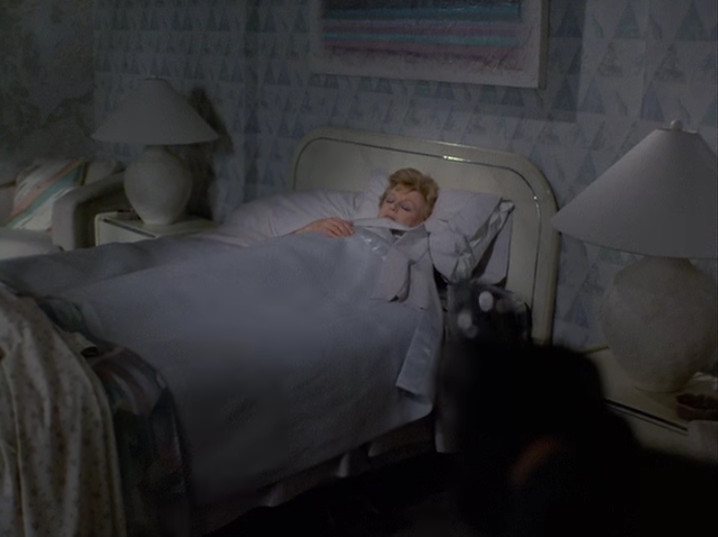
If you ask me, this is playing a little unfair with the audience. We know that Jessica is not going to be killed in an episode, but here the gun is actually pointing at her. The camera does move to showing only the gun, from the side, when it fires, though. The next scene (which I suspect is after a commercial break, in the original airing) has Rod coming over to check on Jessica.

The guy in blue who is kneeling is extracting the bullet from the cushion of that chair. Now, granted, the gun is not in focus in the earlier frame, but it really looks like it’s pointing directly at Jessica and nowhere near the chair. The bullet is from a .38 pistol and hasn’t been made in twenty years, btw. Jessica asks the police detective (the guy in the blue suit who pulled the bullet from the cushion) to humor her and compare the ballistics of the bullet to the one from the Jarvis case.
The next morning, Jessica and Georgia follow through on their plan to visit Mrs. Jarvis.
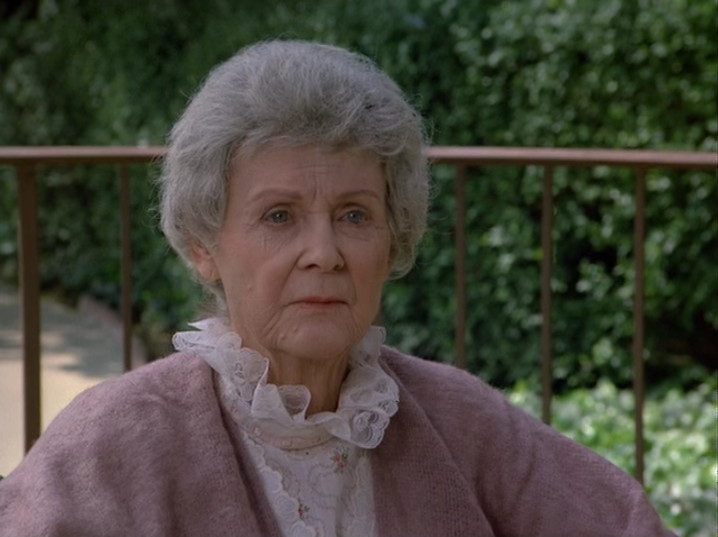
Unfortunately, it turns out that she has dementia and doesn’t even know that her husband is dead. Sydney walks in on them after Mrs. Jarvis tells them about the roses that her husband grows and they question him a bit more. He claims that Mrs. Davis is lying about when her grandfather took over the firm and it happened in a “proxy fight”, which was a matter of public record. This implies that the company was publicly traded, because proxy voting of shareholders is only a thing in publicly traded companies. That’s not of great significance, except that if it is a publicly traded company, stock purchases that give somebody more than 5% ownership of the company are public record, which Jessica should know. That said, proxy fights are about getting the shareholders to vote for somebody (or some bodies) for the board of directors of the corporation, they’re not about ownership. I think we need to chalk this one up to Hollywood writers having no idea how corporations actually work.
After saying goodbye to Sydney, Jessica and Georgia take a minute to discuss the shot fired into her hotel room chair. Whoever it was, Jessica points out, it certainly wasn’t Mrs. Jarvis. Further, it clearly wasn’t an attempt on her life. The shooter had all the time in the world to aim carefully, or even to fire a second or third shot, if he really wanted Jessica dead. Jessica then asks for a lift to back to Herne and Jarvis (the firm).
At first Mrs. Davis is reluctant to see her but, through an intercomm trick, Jessica gains entry. They talk for a bit, but nothing really comes of it. After Mrs. Davis angrily tells Jessica to leave, Jessica replies, “If you’ll forgive me, Mrs. Davis, it appears to me that you suspect your grandfather more than anyone.” As far as I can tell, that includes the audience. This is the last we see of Mrs. Davis, and we’ve still got fifteen minutes to go.
I still don’t understand why she was here. I suppose it’s supposed to be a red herring but at best it’s a pink herring. Mrs. Davis is angry and defensive but we’re never given any reason why she’s angry and defensive. Or if Jessica is right that Mrs. Davis suspects her grandfather, there’s no reason why she suspects him—at least none that we’re given—so her defensiveness doesn’t feel like it comes from anywhere.
Later on, in her hotel lobby, Jessica tells Sam and Georgia that unfortunately the ballistics report on the Jarvis case went missing with the rest of the case file. After they leave she gets a telephone call from someone claiming to have information on the Jarvis case but she has to come alone. He won’t give his name but Jessica goes anyway. She takes a taxi.
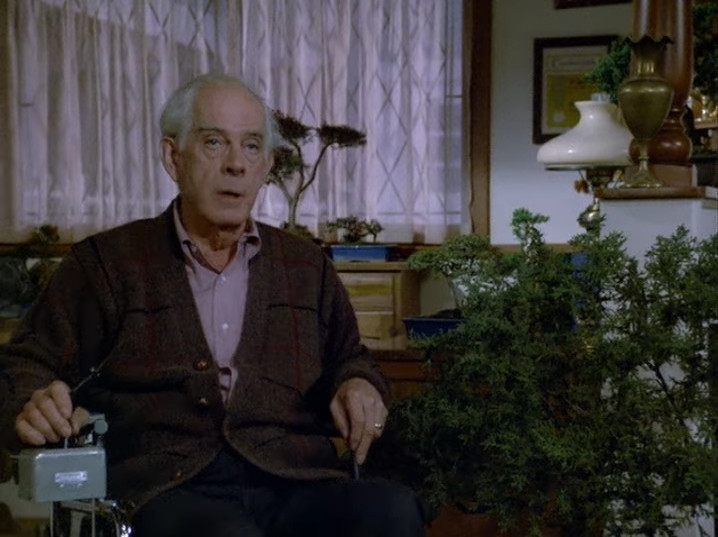
It turns out that it’s Colonel Potter in a wheelchair. Recognizing the actor by his most famous role aside, it’s actually Lieutenant Webb, who had been in charge of the case thirty years ago. He apologizes for all of the intrigue but it had to be strictly unofficial. How waiting until Jessica got to his house to admit to his name makes it any less official than telling her his name over the telephone, he doesn’t explain. He also couldn’t face the Wilsons, because he always had the feeling that Sam Wilson was innocent. He couldn’t do anything, though, because the DA told him to wrap up the case quickly and that his job was to collect evidence, not to judge the case. This bit of backstory out of the way, he gets to the reason he asked her to come—he’s got the old case files, including the ballistics report from the Jarvis case.
The bullets match.
They discuss the case for a while, which is fun because Harry Morgan is a wonderfully charismatic actor. They don’t really add anything to the case, though. Jessica suggests that perhaps the killer thought that he would benefit, but was wrong. Webb said that he entertained that theory, in particular that Thelma Vantay, the secretary, might have been having an affair with Jarvis and thought she would benefit, but they checked it out and Jarvis seemed to be faithful to his wife. He wishes Jessica well on her investigation of the case, and she leaves to go see Thelma again.
Thelma is initially reluctant to talk but Jessica points out that the statute of limitations for blackmail has passed. Once she understands the significance of this, Thelma opens up, though curiously she mostly just confirms what Jessica guesses. She knew about the life insurance policy increase and she had heard Jarvis talk about suicide a few times, so when he ended up dead, she figured out what happened and blackmailed the Jarvises. In particular, she blackmailed Sydney. What, exactly, she blackmailed him with is not entirely obvious, though. She didn’t know anything that the police didn’t know—certainly they knew about the life insurance policy. I suppose she could have told them that Jarvis had talked about suicide before, which might corroborate Sam’s story, but it’s thin material to blackmail someone with.
Jessica and Rod get to talking about it. He thinks that they can now prove suicide but Jessica is bothered by the gun being used to shoot near her. Why? It doesn’t really make any sense to attract this sort of attention to the case so unnecessarily.
Jessica then has an epiphany.
They go to the Jarvis house and press Sydney until he makes a slip and says that the gun was thrown under the Santa Monica pier. This wasn’t public knowledge; all that the public was told was that the gun was disposed of. Sydney admits to following Sam to the pier and retrieving the gun, because, he says, he killed his father. Jessica asks if he isn’t covering for his mother, instead. The Wilsons point out that Mrs. Jarvis couldn’t have fired the gun near Jessica the other night and she agrees—it was a mistake to think that the same person who killed Jarvis fired the gun near Jessica. Sydney did it to direct attention away from his mother, who had the perfect alibi for the second crime.
Sydney admits to it all. His mother didn’t mean to kill his father. She came back to the library to retrieve a book and came across him when he was in the process of trying to commit suicide. She grappled with him, but in the struggle the gun went off and he was killed. It was an accident but with the insurance money no one would believe that. So Sydney tried to cover it up. He even tried to protect Sam by putting pressure on the DA to close the case quickly, except that backfired when Thelma figured out what was going on and blackmailed him. He had to choose between Sam and his mother, and chose his mother.
The Wilsons and Jessica leave. On the way out Rod says that he will call the DA but Sam tells him not to. He has the closure he wanted—it would be absurd to prosecute Mrs. Jarvis, who didn’t really commit a crime, and Sydney was only trying to protect his mother. They know what happened, which is enough for him. Rod appeals to Jessica, who says that justice is imperfect and that sometimes there’s a difference between serving the ideal of justice and doing what’s best. Sam and Georgia kiss and the episode ends with Jessica smiling on them.

Before I get into further analysis of the story and it’s ending, I have to say that it’s frustrating how utterly incompetent Hollywood writers are at moral philosophy. Justice is not always imperfect. Human attempts to achieve justice are always imperfect. Worse still is the consequentialist conclusion that when a principle doesn’t produce the consequences you want, to hell with the principle. What they really want to get at is the perfectly legitimate conclusion that they do not have it within their power to achieve justice and invoking the criminal justice system, which is a blunt instrument wielded by flawed human beings, is not permissible because it will not achieve the end for which it will be invoked.
That said, it seems likely that the statue of limitations on withholding exculpatory evidence for a charge for a crime that was not committed has probably run out quite a while ago, so the whole thing is almost certainly moot. If the DA could not bring any charges calling him doesn’t matter, one way or the other.
That out of the way, it is curious that this episode has a different ending than the movie it used as a source did. In Strange Bargain, it turned out that Mrs. Jarvis actually did kill her husband and set the murder scene to look like suicide. The movie ends with her admitting this to Sam before she kills him; Lieutenant Webb arrives just in time to save Sam.
Obviously, they did have to change the ending to the movie in order to justify the episode and I think that on the whole they did change it in a way that at least made sense. They could have done a better job than an accidental death that basically was a suicide, just with someone else trying to claw the gun away when the suicide was committed. It really having been the business partner, for example, would have been a more interesting reveal, though they couldn’t have the weird sub-plot where the same gun was used to shoot at Jessica had they done that. The other odd thing about this ending is that it doesn’t really change anything for the characters in the story. Jarvis did really kill himself and the only people who have learned that are people who already believed it. Why Sam was brooding when the episode started and now is willing to forgo public exoneration is not really explained. Such character development is possible, of course, it just didn’t happen in this episode.
On the other hand, TV shows are, structurally, short stories. Short stories are about sketching out stories, not about painting them in full. We could certainly imagine a story in which a man who was wrongfully convicted of murder at first broods but then in the course of helping a sleuth investigate what really happened comes out of his shell and, though he can’t prove the truth, has spent enough time focusing on something that is not himself that he no longer needs to prove it to anyone.
Though it is not a conventional detective story, it is possible to tell a detective story in which the detective uncovers the truth but it doesn’t do anyone any good. To some degree the Poirot story Five Little Pigs is that. Poirot uncovers the truth but the only person he helps by doing so believed it, or at least part of it, already. (She believed that the person convicted was innocent; she did not know who was guilty.) A few other people who didn’t know it now do, but that’s it. Yet, it is profoundly satisfying because the mystery was such a tangle and everything about it makes so much more sense when it is untangled. It is not merely satisfying to see a puzzle unraveled; it also gives insight into how possible it is to misunderstand fragmentary facts. It’s an extremely good story and I think that The Days Dwindle Down is an enjoyable episode in part because there are fuller versions of it like Five Little Pigs.
Overall, I think that The Days Dwindle Down could have been, realistically, better than it was. Probably the better outcome would be to have revealed someone else as the murderer. Failing that, it would still have been better to come up with some sort of exculpatory evidence which did actually prove suicide. It’s hard to think what that could have been since the premise was that Sam had destroyed it all; some sort of witness is about all that could be done. To be fair, that’s actually what they did, except that the witness still refused to talk publicly. I think that the best way out, here, would have been the route of Five Little Pigs—a witness who misunderstood what he saw all these years. This would have been easier if there had been something else in Strange Bargain such as a bump on the head that could have been caused in a previous struggle. Unfortunately, that movie had a different purpose in mind, so it didn’t provide these things. With what we’re given, I’d say that it would have made more sense for Herne to have brought his granddaughter in the car, somehow, perhaps after the death but before Sam arrived, and she got bored and came out and saw her grandfather in the room with the corpse, and thought that he did it. Unfortunately, we couldn’t have a flashback for any of this, since it wasn’t in Strange Bargain, but a flashback isn’t a strict requirement here. The flashback that they had was very incomplete, as it was.
If a flashback was an absolute requirement then I think it would have been better to go through with how Strange Bargain actually ended, with Mrs. Jarvis having murdered her husband because he wouldn’t go through with it. Sydney could have protected his mother. That would make him an accessory after the fact, though, so he still wouldn’t be able to come forward (depending on the jurisdiction). If they had gotten rid of the shooting at Jessica, he could have been merely a witness who didn’t come forward, though, which wouldn’t have been so bad. They could have changed the ending around so he would have been willing to publicly exonerate Sam, now that his mother has dementia (or she could have recently died). That would have been better, and still allowed the use of flashbacks from the movie in the denouement. Not as good as the other options, but still an improvement over an accidental death.
All told, yes, it could certainly have been a better episode, but The Days Dwindle Down was a good episode and the idea of using flashbacks from a 38 year old movie was a lot of fun.
Discover more from Chris Lansdown
Subscribe to get the latest posts sent to your email.

Pingback: Murder She Wrote Recap – Chris Lansdown
Lieutenant Webb, a sly reference to his role as on Jack Webb’s Dragnet. 🙂
LikeLike
I had wondered the same thing but the character had the same name in Strange Bargain, which came out in 1949, while Harry Morgan wouldn’t play Bill Gannon until 1966. Dragnet wouldn’t even be a TV show until 1951. It was, however, a radio show in 1949, with its first episode airing on June 3rd of that year. Strange Bargain was released on November 5th of 1949, so while the timing is tight, it would not be, strictly speaking, impossible, for it to have been a reference. If it was, though, it couldn’t have been because of Harry Morgan. It seems likely that it’s just in the category of “strange coincidences do happen”.
LikeLike
Pingback: Murder She Wrote: The Way To Dusty Death – Chris Lansdown